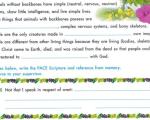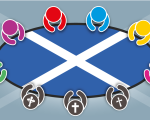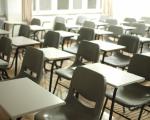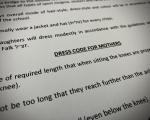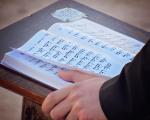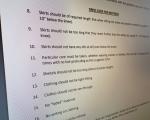Transport to faith schools
Discrimination on grounds of religion and belief is prominent in the provision of both discretionary and statutory home to school transport. We seek equitable school transport policies, free from religious privilege, fair to all families and fair to taxpayers.
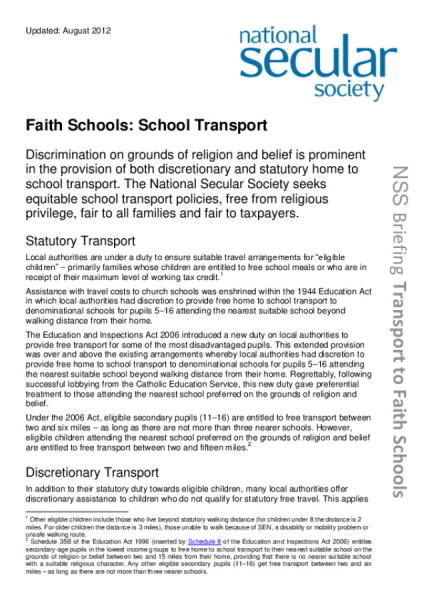 Faith Schools Transport Briefing Paper (PDF, 222 Kb)
Faith Schools Transport Briefing Paper (PDF, 222 Kb)
Related news
Anti-science textbooks teaching creationism used in schools
Posted: Wed, 31 May 2023 10:27
Textbooks which present the theory of evolution as a conspiracy theory are being used in UK schools, a new report has revealed.
Researchers from UCL found textbooks published by Accelerated Christian Education (ACE), one of the world's largest fundamentalist Christian education groups, presented climate change denial as a fact and described evolution as an 'absurd and discredited' conspiracy.
The latest editions of the textbooks claim to show evidence that human-caused climate change is not real. They say God has a plan to prepare a new heaven and Earth with a better climate.
Despite claims by the curriculum's developers that its materials allow students to make up their own minds about evolution, the textbooks describe those who accept evolution as making an "immoral choice", with their belief being "driven by a determination to sin and to rebel against God."
ACE materials also malign the scientific community and those who accept scientific findings about evolution, cosmology, or any other field that challenges young-Earth dogma.
The report also found students are not exposed to any ideas contrary to ACE's literal interpretation of the Bible until Year 9. This is contrary to the legal requirement that schools teach a "broad and balanced curriculum", the report argues.
Although 11 schools in England and Northern Ireland are officially affiliated with ACE, due to the secretive nature of the organisations involved the actual number of schools employing ACE resources may be substantially higher.
Independent faith schools have previously been subject to regulatory action after being found teaching creationism.
The report's lead author, Dr Jenna Scaramanga, questioned how schools which rely heavily on ACE publications passed Ofsted inspections, given that the materials "clearly fail" to provide a broad and balanced science education and to teach respect for different beliefs.
Dr Scaramanga also said the way children are taught science through ACE makes them more susceptible to believing other conspiracy theories.
NSS: 'Action needed from Ofsted and DfE'
Jack Rivington, campaigns officer at the National Secular Society, said: "This report should prompt further investigation by both Ofsted and the DfE.
"The promotion of creationism and climate change denial, along with the denigration of those who accept scientific theories, is clearly inconsistent with schools' responsibility to teach a broad and balanced curriculum, and promote respect for others.
"As the report makes clear, ACE's efforts at indoctrination can be deeply harmful to those on the receiving end. Authorities must now act swiftly to protect the right to an education for all children."
Image: From 7th Grade Science Pace Set by ACE
Established church hinders religious freedom, NSS tells UN expert
Posted: Tue, 30 May 2023 08:37
The NSS has told a UN expert that lack of separation between Church and state is undermining freedom of religion or belief in the UK.
Orkney Council ends voting privileges for religious appointees
Posted: Wed, 10 May 2023 11:11
The National Secular Society has welcomed a Scottish council's decision to end voting privileges for unelected religious appointees.
Orkney Council has joined three other Scottish councils in ending voting concessions for the religious representatives sitting on the local authority's Education, Leisure, and Housing (ELH) committee.
Councillors voted 12 to 9 in favour of removing their voting privileges in a full council meeting last week.
The Local Government (Scotland) Act 1973 obliges local authorities in Scotland to appoint three religious representatives to their education committees, at least one of whom must be appointed by the Roman Catholic Church and one by the Protestant Church of Scotland.
Such representatives have voting privileges in most councils, enabling them to influence local education policies affecting both faith and non-faith schools. They are generally the only unelected members granted such concessions, an issue raised by members of Orkney Council at the meeting.
The council's decision brings religious representatives in line with the ELH committee's two teacher representatives, who also cannot cast votes.
Green councillor John Ross Scott, who put the motion forward, said he finds it "bewildering" that unelected religious representatives retain the right to vote on education committees, despite the sharp decline of religious affiliation in Scotland. A 2018 poll found almost 60% of Scots were non-religious, including almost 70% of 18-24 year olds.
The legal requirement for Scottish councils to appoint religious representatives is being increasingly challenged by local authorities. In 2019 Perth and Kinross Council became the first to strip them of voting privileges. Following campaigning from the NSS and others, Moray Council and Scottish Borders Council followed suit.
Fife Council is also considering removing voting privileges for religious appointees. They are being lobbied by churches to retain these privileges.
Last year several members of Shetland Islands Council expressed dissatisfaction at being required to appoint a religious representative to the authority's education committee, with councillors describing the situation as both "unconstitutional and undemocratic" and "ridiculous in the 21st century".
Scotland's then-Education Secretary Shirley-Anne Somerville MSP subsequently told the NSS there are "no plans" to end places for religious appointees on education committees. She said the presence of "significant numbers of denominational schools" in Scotland and the "requirement to provide Religious Education" means there "continues to be a role for religious groups in decision making for denominational and non-denominational schools alike".
NSS: 'We hope other councils follow suit'
Head of campaigns Megan Manson said: "We welcome Orkney Council's decision to join the growing number of Scottish local authorities who have stripped religious representatives of their archaic and undemocratic voting privileges.
"Religious appointees are the only unelected members given voting concessions. This makes no sense in the context of an increasingly irreligious and diverse society. We hope other councils are watching and will follow suit.
"The next step should be to repeal the requirement for religious representatives on councils. Rather than entrenching existing religious privilege, the Scottish government should be aiming to make Scotland's education equal and inclusive for all."
NI faith schools cost taxpayer extra £226mn every year
Posted: Tue, 18 Apr 2023 15:24
Northern Ireland's religiously divided education system costs taxpayers £226mn extra each year, a new study has revealed.
The research from Ulster University, which was part funded by the Integrated Education Fund, examined the additional costs incurred by educating children from Catholic and Protestant backgrounds separately.
It found that the division of schooling along sectarian lines leads to the unnecessary duplication of services such as school transport, as well as increased administration expenses caused by Northern Ireland's "complicated educational structures".
A general excess of unfilled places caused by separating schools to "cater for various communities" also increases expenditure needlessly.
This duplication of institutions is present even in small or rural settlements, with two sets of teachers "teaching the same curriculum in each school, often to very small classes" along with the "duplication of principals and support staff".
Northern Ireland has a high proportion of small primary schools, which the research suggested may result from this kind of duplication.
The research estimated the total additional cost of the divided education system to be around "£600,000 every day of the year" – though it also allowed for the possibility that the number could be even higher.
In addition to this public expense, the research estimated that personal costs for car owners caused by the need to travel greater distances to a school of the 'relevant' religious character was in excess of £20mn each year.
This additional, unnecessary travel is thought to be around 130mn miles each year, leading to a "considerable environmental impact" and emitting "more than 9,000 tonnes of carbon dioxide".
Around 92% of children and young people in Northern Ireland continue to be educated separately, despite the existence of widespread support for integrated education.
The vast majority of schools have very few pupils from the 'other' community, and around 30% of schools do not have any representatives of the other community whatsoever.
In addition to the financial savings, the research also said there were likely "considerable social benefits" to educating children together, including the reduction of prejudice against racial and religious groups.
It also suggested that integrated education's improvements to social cohesion would render the work of organisations which exist solely to "ameliorate the divisions in [NI] society" unnecessary.
The costs for such organisations, which are often funded through the Department of Education, can be substantial. For instance, the cost of Shared Education programmes, which attempt to bring communities together in schools, totalled £191.25 million between 2020 and 2022.
The report argues that removing "the need to devise ways of children and young people learning about each other outside school", in addition to addressing the issue of duplication, could create considerable additional savings.
Despite these potential benefits, the research notes that "pressure groups on either side strive to retain schools to serve their 'own' community."
NSS: 'We can't afford to continue religiously segregating schools"
Jack Rivington, campaigns officer at the National Secular Society, said: "This new research clearly sets out how dividing schools on the basis of faith is bad for children's education, bad for social cohesion, and even bad for the environment.
"Every penny currently wasted on pandering to religious sectarianism would be far better invested in integrated schools which educate children together, irrespective of their background.
"It's evident that the majority of citizens in Northern Ireland support such measures - the government should listen to public opinion and prioritise the interests of children, not the misplaced priorities of religious lobbyists."
Image: Aubrey Dale, CC BY-SA 2.0 via Wikimedia Commons
Faith school told pupils about “negative impact” of homosexuality
Posted: Thu, 13 Apr 2023 14:50
A faith school discussed the "negative impact of homosexuality" with pupils as part of its response to allegations of sexual harassment.
In a new inspection report, Ofsted said that Darul Uloom London School's response to "emerging allegations of sexual harassment" made by pupils had been "insensitive" and may stop children discussing similar allegations in future.
Darul Uloom is an independent Islamic boarding school in Chislehurst, Kent for boys aged 11-19.
In relation to an incident concerning "alleged behaviour of one child towards another child", Ofsted said the school's response did not demonstrate "the best safeguarding practices" by focusing on the 'negative effects' homosexuality was having on the school.
Ofsted also said that the school's approach to the incident had not been "child centred".
In its safeguarding and child protection policy, the school claims to be an "open environment where young people feel safe to share information about anything that is upsetting or worrying them". It also said it had a "strong and positive PSHE/RSHE curriculum" which tackles issues including "prejudiced behaviour".
The "safeguarding of children from sexual harassment" was described by Ofsted as "an area for further improvement" at the school.
Ofsted also noted that "serious incidents" which occurred at the school since the last inspection are under investigation by the appropriate authorities and that school leaders were working "closely with partner agencies to address any safeguarding concerns and allegations against staff members".
Ofsted said that it does not have the power to investigate incidents of this kind.
Darul Uloom's leadership was also described in the report has having a "clear vision" for the school centred around the "Islamic faith and ethos".
The school has since received a warning notice from the Department for Education. Notices are issued when Ofsted or the Independent Schools Inspectorate identify breaches of the independent school standards.
Following a notice being issued, schools must submit an action plan on how they intend to rectify the identified failings and can be closed if improvements are not made.
Recent figures from the DfE revealed that independent schools with a faith ethos are four times more likely to be issued with warning notices than their non-religiously affiliated counterparts.
NSS: 'Role of faith ethos deeply troubling'
Jack Rivington, campaigns officer at the National Secular Society, said: "The incidents described by Ofsted in this report are highly concerning, and raise questions regarding the extent to which the school's faith ethos is interfering with necessary and requisite safeguarding measures.
"Describing the 'negative impact of homosexuality' with students in response to allegations of sexual harassment being made by a child is utterly unacceptable, and it is appalling to think that this incident may discourage students from coming forward with similar allegations in future.
"Religious moralising should never be prioritised over the wellbeing of children. The operations of this school should now be closely reviewed to ensure that students are properly safeguarded."
Government agrees to include NSS findings in school admissions review
Posted: Thu, 23 Mar 2023 14:52
The government has said it will consider National Secular Society research on faith schools as part of its next review of school admissions.
An NSS report published last month revealed how religious requirements in the oversubscription criteria of 14 state-funded faith schools' admissions policies are being used to impose extreme religious ideology on families.
This includes attempts to control aspects of families' private lives, including parents' sex lives, which the NSS argued may breach human rights.
Many of the requirements also resemble rules imposed by high-control religious groups on their members, as identified by 'cult' watchdog The Family Survival Trust.
In its report, the NSS argued that the schools are exhibiting coercive and controlling behaviour, which can be a criminal offence within the context of an interpersonal relationship.
Several schools required applicants to follow Jewish 'purity laws' regarding sex. These rules concern when a married couple may have sexual intercourse or come into physical contact with one another, according to the timings of the woman's menstrual cycle.
Other practices required by schools included:
- Children having no access to the internet or television, and for children to be forbidden from visiting the cinema or theatre.
- Parents and children following strict dress codes at all times, including outside of school, such as 'modest' dress for women and girls.
- Following a halal diet and fasting during Ramadan.
In response to the report, Minister for Schools Nick Gibb said he would consider the report's findings and recommendations as part of the next review of the School Admissions Code.
School admissions policies must comply with the admissions code. A policy's compliance with the code is determined by the Office of the School's Adjudicator (OSA).
Despite the existing code requiring that admissions policies are "reasonable, clear, objective, [and] procedurally fair" and compliant with "all relevant legislation, including equalities legislation", several complaints to the OSA regarding the kind of extreme religious requirements set out in the report have been unsuccessful.
The NSS recommended that the Schools Admissions Code be updated to specifically prohibit oversubscription criteria which breach human rights, and that further guidance is provided to the OSA regarding the code's enforcement and application.
NSS: Government commitment is "welcome"
NSS campaigns officer Jack Rivington said: "The government's commitment to consider the report's findings and recommendations in its next review of the School Admissions Code is welcome, as is the recognition of concerns regarding human rights breaches.
"Fundamentalist religious organisations must not be able to use schools as a means to exert control over members of particular religious communities. The practices identified in the report are intrusive and harmful. Their presence in our education system is deeply alarming.
"A wider assessment of the role of discriminatory faith-based admissions in facilitating these kind of practices should now follow."
NSS calls for faith-based RSE to be included in review
Posted: Mon, 13 Mar 2023 16:58
The National Secular Society has urged the government to consider the potential harms caused by faith-based relationships and sex education (RSE) in its upcoming review of the subject.
Last week, prime minister Rishi Sunak ordered a review into RSE amid concerns some schools are using age-inappropriate resources or teaching contested ideas about gender in RSE lessons.
In a letter to Nick Gibb today, the NSS said this review should include an examination of faith-based RSE, as it has found many state-funded faith schools teach discriminatory religious dogma as part of their RSE curriculum.
In 2018, NSS research found many faith schools explicitly teach that same-sex relationships are wrong and criticise sex outside of marriage. Many condemn contraceptives and abortion, and some teach taboos around menstruation. These teachings contradict advice from healthcare and education professionals and are inconsistent with the Equality Act 2010.
State-funded faith schools are permitted to teach RSE in line with their "distinctive faith perspective on relationships". Even for state schools without a religious designation, the RSE guidance says: "In all schools, when teaching [RSE], the religious background of all pupils must be taken into account when planning teaching".
Schools without a religious character have frequently come under pressure from religious lobbying groups opposed to teaching about same-sex relationships. One such group, Parents United, recently hosted a conference where speakers told attendees gay children must be taught to 'repent'.
Last month, research by Just Like Us found one in three teachers says faith acts as a 'barrier' to discussing LGBT+ topics in school. Amongst those who work at faith schools, the number increased to almost half, with 46% feeling that faith impeded their ability to engage in open discussions.
NSS: Not considering faith-based RSE will "fail thousands of children"
NSS chief executive Stephen Evans said: "If the government is to review how ideologised teaching and resources lead to distorted, biased or inaccurate RSE, this must extend to religious ideology.
"A failure to consider how religious ideology distorts RSE will not only demonstrate inconsistency on this issue – it will fail thousands of children at faith schools who are being taught that it is wrong to use contraception and it is wrong to be gay.
"We therefore urge the government to include faith-based teaching of RSE within the scope of its review to ensure the curriculum is impartial, objective, inclusive and free from unscientific ideology of all kinds."
Faith school not teaching any secular subjects, Ofsted finds
Posted: Wed, 8 Mar 2023 16:40
An independent faith school is teaching "no secular subjects" from Year 8 upwards, a new Ofsted report has revealed.
Talmud Torah Machzikei Hadass School, a Jewish school for boys in Hackney, was judged to be inadequate during its latest inspection, with Ofsted describing the curriculum as "narrow".
In the primary phase of the school, the only secular subjects are English, mathematics and science. Other secular subjects such as physical education and history are not taught.
Once pupils reached the secondary phase of the school, this curriculum is "narrowed further" according to Ofsted. Pupils only study a "Hebrew curriculum, with no secular subjects taught at all".
Ofsted said these "weaknesses" in the curriculum meant students are unable to develop their knowledge and skills.
Despite being informed of these weaknesses in previous inspections, the actions of leaders to secure necessary improvements were described by Ofsted as "not being taken quickly enough".
The report also criticised the school's leadership for giving "too little attention to putting in place a suitably broad and ambitious secular curriculum" and for failing to ensure pupils have the knowledge needed for "their future lives in modern Britain".
Ofsted also found that the school's programme for relationships and sex education (RSE) does not have regard for the Department for Education's statutory guidance on RSE, with school leaders failing to ensure the curriculum covers "all aspects of relationships education".
Pupils are not taught required content on "different types of respectful relationships" or the protected characteristics as specified in the Equality Act 2010. The curriculum does not encourage respect for these characteristics or explain how they are protected by law from discrimination.
Ofsted inspectors were prevented by the school's leadership from asking pupils about "specific aspects" of the PSHE and RSE curriculums, including content which is set out in statutory guidance.
The report also highlighted that failings identified during this inspection, particularly in relation to the quality of education, had been "repeatedly identified during previous inspections of the school".
Previous inspections have also judged the school to be inadequate, with none finding it of an acceptable standard since 2014.
A restriction imposed by the Secretary of State for Education preventing the school's proprietor from admitting any new pupils from 17 February 2022 onwards remains in place.
The school attracted controversy in 2015 after rabbis involved in its management said that women driving went against "the traditional rules of modesty" for their sect, and that children would be prevented from attending schools if they were driven there by their mothers.
NSS: 'Lack of any secular subjects appalling and harmful'
Jack Rivington, campaigns officer at the National Secular Society, said: "An institution which fails to teach any secular subjects is undeserving of being regarded as a school – its purpose is indoctrination, not education.
"By continuing to disregard the findings of Ofsted, and doing next to nothing to rectify its repeated failings, the school shows contempt both for inspectors and the independent school standards.
"Education should be about creating opportunities and possibilities for students – the restrictive curriculums of faith schools such as this one run totally contrary to those purposes, and are harmful to children."
Image by Darelle from Pixabay
The state must stop faith schools behaving like cults
Posted: Tue, 7 Mar 2023 09:31
New research by the NSS has found some state funded faith schools' admissions policies are so extreme they appear to breach human rights. Jack Rivington calls for urgent reform in the education system to prevent state endorsement of regressive religious practices.
Is it right for a state school to control how their students' families dress, whether they can use the internet, what they can eat, and when they have sex?
As it stands, our government seems to think that it is. In a new report, the National Secular Society has revealed how some faith schools are insisting applicants follow regressive aspects of religious doctrine in order to access a place for their children – and are getting the green light from the state to do so.
In the most concerning cases, some schools insist that families follow so-called 'family purity laws', an aspect of Orthodox Judaism which regulates when a married couple may have sexual intercourse according to the stages of the menstrual cycle. The practice can require women to provide evidence of their vaginal discharge to a Rabbi, and to 'cleanse' themselves in a ritual bathing process following menstruation.
Many of the schools in our study frequently insist upon 'modest dress' for both parents and children, with a particular focus on the clothing of women and girls. Others demand that children only read books approved by the school, and do not access the internet. Adherence to religious dietary practices is also frequently required. Most of the schools stipulate that parents and students obey these rules not only at school, but at all times.
These rules are incompatible with human rights: the right to a family and private life; to freedom of thought, conscience and religion; to freedom of expression; and to an education. The particular emphasis placed on women's 'modesty' also undermines sexual equality.
How have schools been allowed to get away with imposing such rules?
School admissions and coercive control
These requirements are found in the schools' admissions policies, which set out the process for allocating places when a school is oversubscribed. In such circumstances, exemptions from equality law allow faith schools to prioritise applicants according to their religiosity. Whilst this is normally assessed on the basis of criteria such as baptism status or church attendance, our report demonstrates that the current system is allowing schools to push criteria to extremes.
The admissions policy of a school must comply with the school admissions code, which requires oversubscription criteria to be "reasonable, clear, objective, procedurally fair, and comply with all relevant legislation, including equalities legislation". Additionally, the policy must not unfairly disadvantage children from a "particular social or racial group", nor those with a disability or special educational need.
Concerningly, the Office of the Schools Adjudicator – the body responsible for reviewing complaints regarding school admissions policies – has, when reviewing formal objections to religious criteria, found several admissions policies examined in the report to be acceptable. This shows that, in effect, the OSA considers such policies to be compliant with the Human Rights Act 1998 and the Equality Act 2010, because the code specifies admissions policies must comply with this legislation. The OSA decisions also demonstrate that it considers the policies to be to be 'reasonable' – a further requirement under the admissions code.
What possible understanding of 'reasonable' can consider the sexual behaviour of parents legitimate grounds on which to assess applications for places at a school? That the OSA has found no fault with such criteria, either on the basis of reasonableness or in relation to human rights, demonstrates a serious failure in the current system which requires immediate review.
The report's consideration of 'coercive control', which is gaining attention as part of increased focus on the role religion can play in abuse, makes the case for urgent government action even clearer.
Last year, 'anti-cult' watchdog Family Survival Trust (FST) published a report on coercive control in UK religious groups. The report drew parallels between coercive behaviour as defined by the Home Office in connection with domestic abuse, and coercive behaviour observed in high control religious groups. Disturbingly, many of the behaviours identified by the FST are also readily identifiable within the admissions policies of some state-funded faith schools.
The practices of high control religious groups and the policies of the schools examined by our report bear more than a passing resemblance. Based on government guidance, if an individual exhibited the behaviours of these schools within the context of an interpersonal relationship, there is a significant possibility they would be committing a criminal offence. Whilst such practices do not have the same legal status within an organisational context, we should regard them with similar ethical disapproval. That the UK education system is facilitating such practices is therefore deeply alarming.
The school admissions code is enabling schools to impose religious criteria which are entirely unreasonable in their content, coercive and controlling in nature, and in breach of human rights. It is therefore unfit for purpose. In our report, we recommend a review and update of the code as a matter of urgency in order to prohibit criteria which undermine human rights or amount to coercive control. A new code should also provide more detailed guidance to the OSA on how to interpret and apply terms such as "reasonable".
Fundamentally, such issues occur because of the exemption given to all faith schools permitting religious discrimination in their admissions. Without very specific prohibitions, the legitimacy of any religious criteria facilitates the inclusion of all religious criteria. As long as we grant religion an undue influence in UK education, problems of this kind will persist.
Faith schools coercing families with ‘cultish’ practices, NSS finds
Posted: Mon, 27 Feb 2023 15:55
The National Secular Society has found faith schools are trying to control families' private lives, including parents' sex lives, through admissions policies.
A new NSS report reveals how 14 state-funded faith schools may be breaching human rights via their pupil admissions policies.
The report sets out how religious requirements in the oversubscription criteria of the schools' policies are being used to impose extreme religious ideology on families.
Several schools required applicants to follow Jewish 'purity laws' regarding sex. These rules concern when a married couple may have sexual intercourse or come into physical contact with one another, according to the timings of the woman's menstrual cycle.
The practice can also require women to submit evidence of their vaginal discharge to religious authorities in order to determine their 'purity' status, and consequently whether they are permitted to have sex or not.
Other practices required by schools included:
- Children having no access to the internet or television, and for children to be forbidden from visiting the cinema or theatre.
- That parents and children follow strict dress codes at all times, including outside of school, such as 'modest' dress for women and girls.
- Following a halal diet and fasting during Ramadan.
The report argues such rules are not compliant with the European Convention of Human Rights.
They also resemble rules imposed by high-control religious groups on their members, as identified by 'cult' watchdog The Family Survival Trust. Through these religious requirements, schools are exhibiting coercive and controlling behaviour, the NSS said.
'Coercive control' can be a criminal offence within the context of an interpersonal relationship.
School admissions procedures
Schools' oversubscription criteria are used to decide which applicants get a place when there are more applications than places available.
Most types of faith schools can prioritise applicants who share the religion of the school in their oversubscription criteria. Exemptions to equality legislation permit faith schools to discriminate against people on the basis of religion or belief in this way.
Applicants' religious beliefs are usually assessed via baptism status or their attendance at a place of worship.
Admissions policies must follow the School Admissions Code, which requires that oversubscription criteria are "reasonable, clear, objective, [and] procedurally fair" and compliant with "all relevant legislation, including equalities legislation".
Despite these requirements, several complaints from members of the public regarding extreme religious oversubscription criteria have been unsuccessful. The Office of the Schools Adjudicator, which determines whether a school's admissions policy complies with the code, has repeatedly decided not to uphold complaints against policies which include regressive religious practices.
The NSS's report recommends that the Schools Admissions Code be updated to specifically prohibit oversubscription criteria which breach human rights, and that further guidance is provided to the OSA regarding the code's enforcement and application.
It also recommends a review of equality act exemptions for faith schools.
NSS: Imposition of "cult-like" rules is "deeply alarming"
NSS campaigns officer Jack Rivington said: "Our report demonstrates how the privilege and influence granted to religion in our education system enables practices which are intrusive and harmful to children and families, and which run contrary to human rights.
"It is deeply alarming that our taxes are being used to fund schools which impose cult-like rules on children and their families, and that the government body responsible for regulating school admissions policies has been incapable of curbing these practices.
"No school should be able to dictate the sex lives, clothing, internet access or diets of families, especially in the privacy of their own homes.
"But as long as discriminatory faith-based admissions are permitted, issues of the kind highlighted in our report will persist. The exemptions in equality law for faith schools, in addition to guidance on acceptable admissions policies, should therefore be examined as a matter of urgency".
The NSS has shared its findings with schools minister Nick Gibb and education select committee chair Robin Walker.
Notes
- Of the schools examined in the report, 12 have an Orthodox Jewish religious character and 2 have an Islamic religious character.
- All of the schools examined by the report are voluntary aided, which means the local authority funds all the school running costs and 90% of the building costs (in theory the religious body pays for 10% of the building costs).

